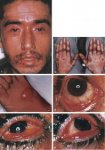I couldn't keep this one to myself when I saw it. Wessely has done some work for the UK military and was their main (or certainly one of their main) Gulf War Illness deniers.
This lovely little paper is interesting, and has some correlations with the CBT School rubbish on ME/CFS. It is basically a political paper, which becomes more obvious towards the end when he makes a reference to the continuing ill health of Gulf war veterans, which he is clearly hinting that they are really suffering from the psychological effects of warfare, or that they are misattributing poor health to their Gulf War service.
In this paper Wessely is not cited as the main writer, though his finger prints and ideology are all over it.
Contributors: EJ undertook the research, analysis of the data, and wrote the paper. IP collected the data. SW helped to design the study and commented on various drafts of the paper. EJ is guarantor.
Funding: Economic and Social Research Council and the Ministry of Defence
Here are some quotes from the paper:
[who wouldn't be afraid of chemical weapons?]
[It was the horrific effects of it and not just deaths I think that concerned people. Also these things are deadly if you inhaled enough, so it was hardly abnormal to be worried about them]
[So they tried to pick people who were exposed but deliberately left out people who were worst affected. Talking about loading up your sample (a bit like the way they exclude people with physical signs from CFS diagnosis/studies), and then go on to waffle about abnormal beliefs. And of course if you exlude the sickest it takes the concerns of everyone else out of context and makes them look abnormal for being worried about it.]
[But these people may have had limited/unsatisfactory medical care, so even if there were other possible explanations for conditions they experienced, they may not have been given them. This doesn't mean they have psychological issues]
[So lets try to exclude all the really sick people as they might mess up the study]
[But they excluded the sickest so the results were a forgone conclusion. Also in some cases the effects of these weapons would be permanent, so it was not irrational or illogical to be concerned about it]
This lovely little paper is interesting, and has some correlations with the CBT School rubbish on ME/CFS. It is basically a political paper, which becomes more obvious towards the end when he makes a reference to the continuing ill health of Gulf war veterans, which he is clearly hinting that they are really suffering from the psychological effects of warfare, or that they are misattributing poor health to their Gulf War service.
In this paper Wessely is not cited as the main writer, though his finger prints and ideology are all over it.
Contributors: EJ undertook the research, analysis of the data, and wrote the paper. IP collected the data. SW helped to design the study and commented on various drafts of the paper. EJ is guarantor.
Funding: Economic and Social Research Council and the Ministry of Defence
Here are some quotes from the paper:
Enduring beliefs about effects of gassing in war: qualitative study Edgar Jones, professor1, Ian Palmer, professor2, Simon Wessely, professor1
1 Institute of Psychiatry and King’s Centre for Military Health Research, Weston Education Centre, London SE5 9RJ, 2 Medical Assessment Programme, St Thomas’ Hospital, London SE1 7EH
BMJ 2007;335:1313-1315 (22 December),
http://www.bmj.com/cgi/content/full/335/7633/1313
[Edit forgot to include this from the abstract:
Conclusions Chronic symptoms and work difficulties maintained beliefs about the potency of chemical weapons. In the period after the war, gas continued to inspire popular revulsion and was associated with a sense of unfairness.]
Recent studies of troops in training or civilians attacked by terrorists have shown that chemical weapons have retained their capacity to frighten.
[who wouldn't be afraid of chemical weapons?]
During the first world war, fears associated with chemical weapons were disproportionate to their killing power
[It was the horrific effects of it and not just deaths I think that concerned people. Also these things are deadly if you inhaled enough, so it was hardly abnormal to be worried about them]
Using records from the first world war, when chemical weapons had become an integral part of the main combatants’ armoury, we explored the ideas and beliefs held by servicemen exposed to gas but not seriously incapacitated. To focus on the psychological effects of gassing, we excluded those who had severe disability. It was important to identify a population for whom corroborative evidence existed of exposure but who could be shown through repeated follow-up and mortality data to be essentially healthy.
[So they tried to pick people who were exposed but deliberately left out people who were worst affected. Talking about loading up your sample (a bit like the way they exclude people with physical signs from CFS diagnosis/studies), and then go on to waffle about abnormal beliefs. And of course if you exlude the sickest it takes the concerns of everyone else out of context and makes them look abnormal for being worried about it.]
We excluded veterans with severe respiratory illness to focus on those whose ideas and beliefs were not grounded in objective pathology directly related to the war. We included pensioners who had occasional or mild episodes of bronchitis because these were recovering conditions that may have been related to other effects such as smoking, industrial pollution, or poor housing.
[But these people may have had limited/unsatisfactory medical care, so even if there were other possible explanations for conditions they experienced, they may not have been given them. This doesn't mean they have psychological issues]
Repeated follow-ups during the period between the wars enabled us to exclude veterans who had tuberculosis, chronic bronchitis, or emphysema associated with gassing
[So lets try to exclude all the really sick people as they might mess up the study]
In general, this group of veterans believed that the effects of chemical weapons were irreversible, potent, and debilitating. These conceptions stood in contrast with the objective measures of health recorded for individuals in the sample and general observations made by specialist physicians. This raises the key question, why did these veterans take such a pessimistic view of their health?
[But they excluded the sickest so the results were a forgone conclusion. Also in some cases the effects of these weapons would be permanent, so it was not irrational or illogical to be concerned about it]
During the war itself, gas was one of the most feared weapons. It inspired emotion out of all proportion to its ability to kill or wound


